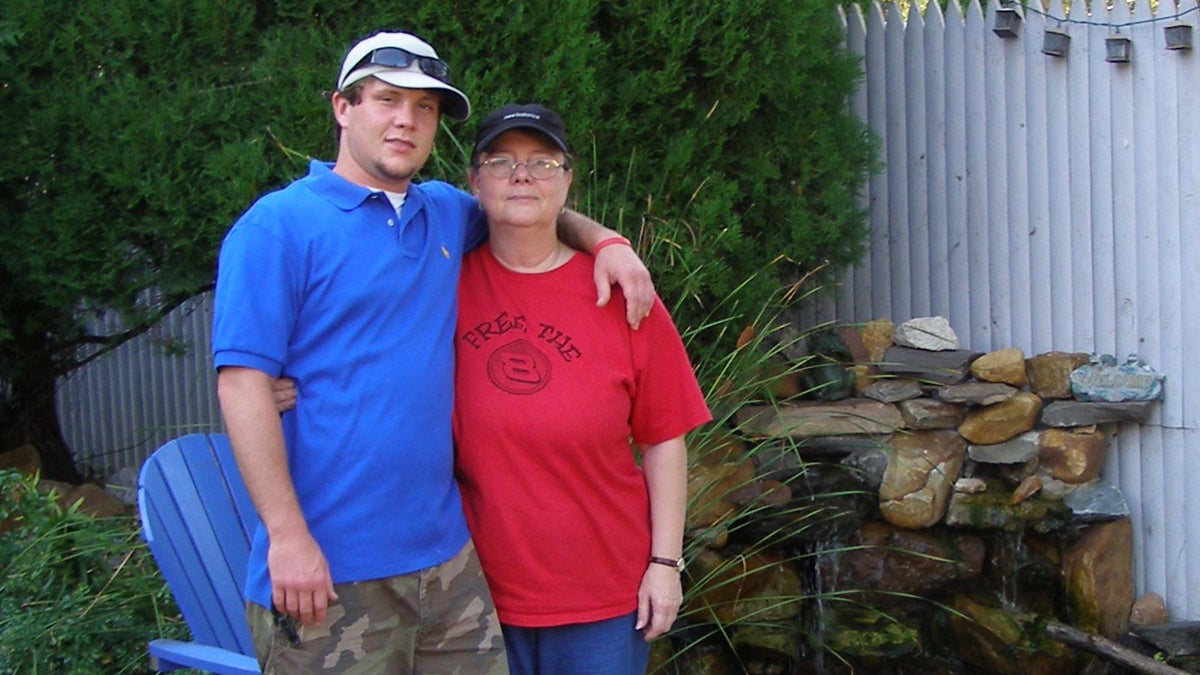Speaking honestly and openly about death from overdose

Liz Perkins and her son John Perkins, who died from an overdose in 2011. (Image courtesy of the Perkins family.)
Losing a child to the disease of addiction carries many facets of shame, blame and stigma. I felt that that aspect of our loss needed to stop, so in my son’s obituary, I was honest about his struggle with addiction.
My oldest child and only son, John M. Perkins, Jr., died in 2011 at the age of 30 of a drug overdose. Losing a child under any circumstances is a horror, but losing a child to the disease of addiction carries many facets of shame, blame and stigma.
I felt that that aspect of our loss needed to stop. So in his obituary, I chose to be honest about his struggle with addiction, whereas many parents choose to say simply that their child “died suddenly.”
If we do not speak out and shine a light on this disease, the status quo will continue, more young adults will die and people will continue to grieve in silence.
A difficult path
John had a very typical childhood: little league, dirt bikes, skate boards, snowboarding—anything a young, handsome, popular boy would do. Everything he did, he did with gusto, and he always took things to the edge.
In high school, he worked below his potential until his senior year, when he realized he wanted to go to the University of Delaware. His freshman year in September 1999 should have been the start of the best years of his young adult life. But as sometimes happens in life, John had some setbacks that I believe set him on the path toward addiction.
My husband and I knew that John consumed alcohol in high school, and we speculated he had used pot. We felt this was somewhat normal adolescent activity. But now his usage had increased, and he had begun to self-medicate with prescription drugs.
Over the next several years, John’s life and thus our lives were on a roller coaster. John dropped out of school repeatedly because of his chronic depression and drug use. Being extremely close, John and I spoke often about his drug problem, but it was a complete shock to me the day I discovered he was using heroin.
A painful education
I was disappointed, sad, scared and very uneducated in this area. I was constantly in a fight-or-flight state of mind, trying to keep him alive and functioning. The most influential help for me at the time was the book “Beautiful Boy,” by David Sheff, which helped me understand that we were not the only family dealing with a child at risk.
I began to learn more about the devastating effects of these drugs on brain function and how very difficult addiction is for the user. I watched John suffer through so many things as he tried to overcome his disease—in detox, rehab, jail. He told me many times that if I were ever afraid for his life, or others, I should call the police and have him arrested. He said he could dry out in jail. Help was hard to find, expensive and generally ineffective.
During John’s sporadic periods of being clean, we would have our wonderful son back, with the hope that he could successfully slay his demons. However, after one nine-month stretch, I got a devastating call from his girlfriend. She had found him on the bathroom floor unconscious and called 911. I called my husband, hysterically telling him to meet us at the ER of our local hospital, which has a good trauma rating.
John was on life support for almost two days. We held vigil at his bedside. Family and friends took over the waiting area near his room, taking turns holding his hand and praying for him to wake up. He never did. The second of two brain scans showed no activity, and they declared time of death: 18:25 p.m., May 5, 2011, the day my life changed forever.
When I close my eyes and remember that moment, all I see is his beautiful face, lifeless.
Devastation, then recovery
I now had to face the last third of my life without my wonderful, loving, full-of-potential son—something I could not fathom under any circumstances. It took me two months to find the national grief group, Grief Recovery After a Substance Passing, and I started the first, and to this date, only, chapter in Delaware.
I have seen many parents and friends come though my group, and I have heard their story, which was my story, over and over again. It opens my wounds each time, but accepting new parents into the group no one wants to join lets them be around people who understand their pain and grief.
My family joined three others to speak out in the Delaware House and Senate in support of the Good Samaritan 911 bill, designed to make it easier to help someone overdosing from drugs. We brought pictures of our four lost children to give the disease of addiction a vocal and visual context.
Our legislature responded by passing the law before the end of the first session, and Gov. Jack Markell signed it on July 2.
It took true courage to bring our loss and grief into the public domain. We hope we have paved the way for more to speak out
The “Kristen L Jackson & John M Perkins Jr. Law” now gives legal immunity to people who seek medical assistance for someone who is overdosing. Long after his father and I are dead and gone, John’s law will save lives, and for that we are proud of our beautiful boy.
WHYY is your source for fact-based, in-depth journalism and information. As a nonprofit organization, we rely on financial support from readers like you. Please give today.

